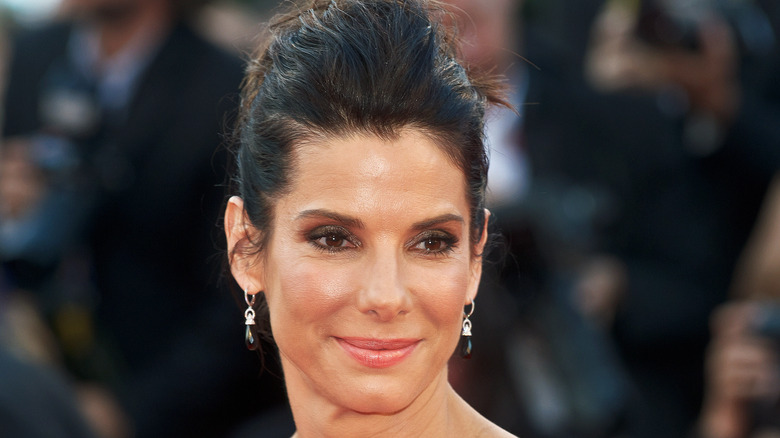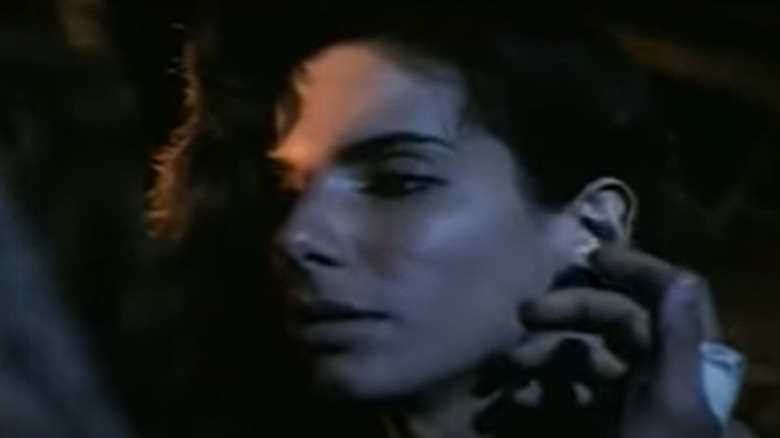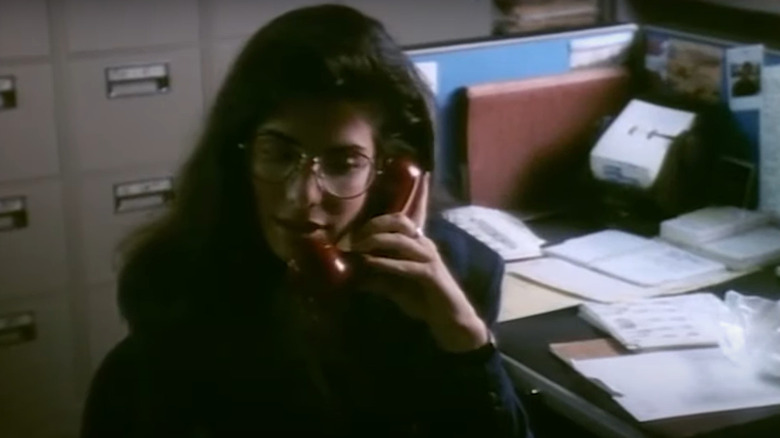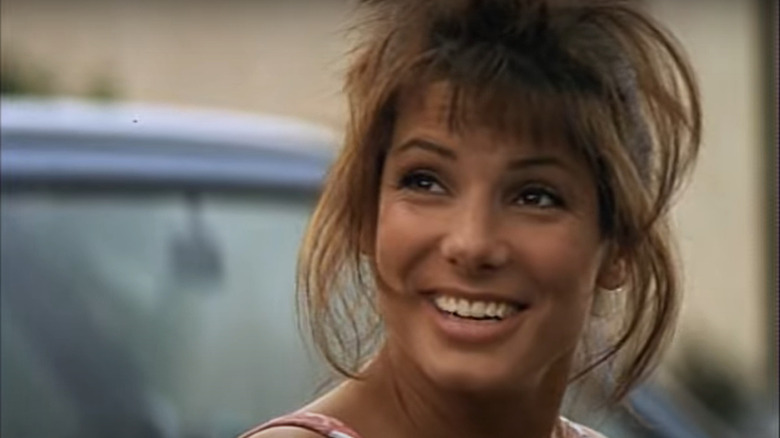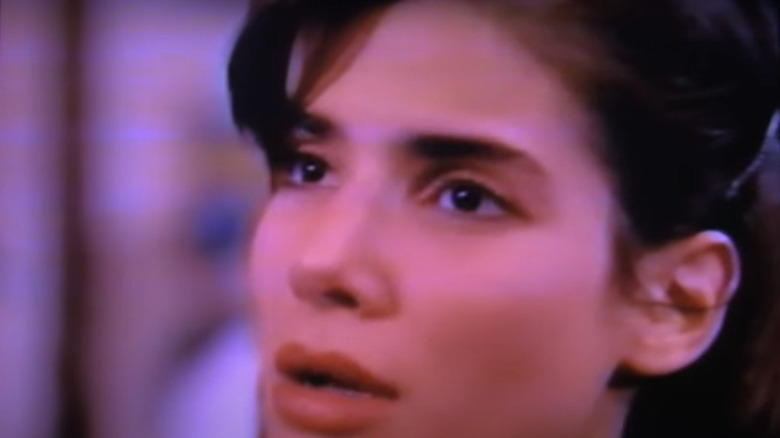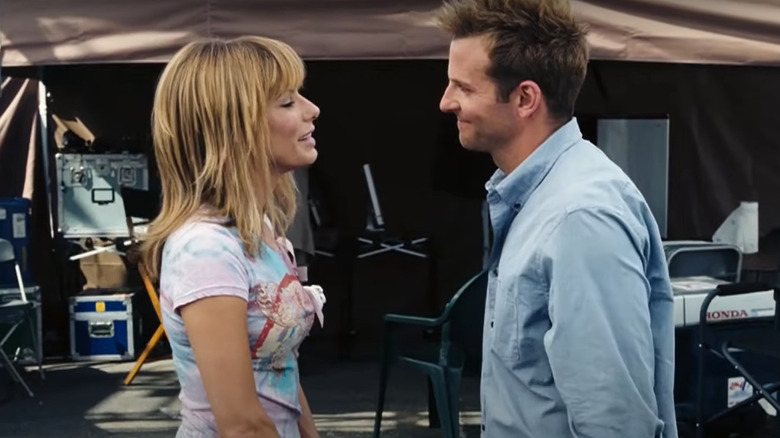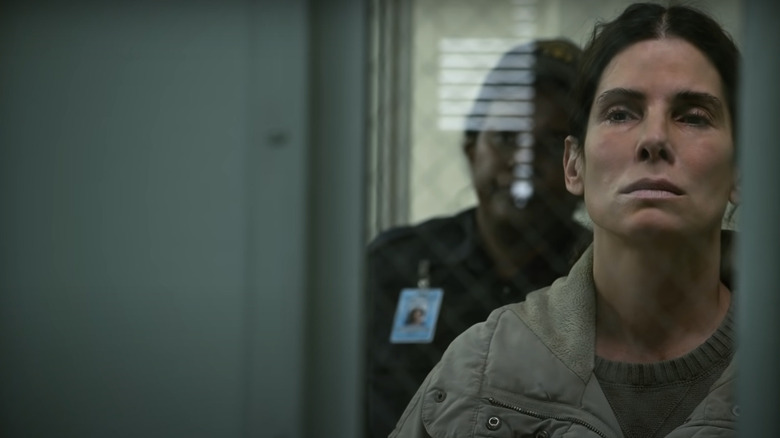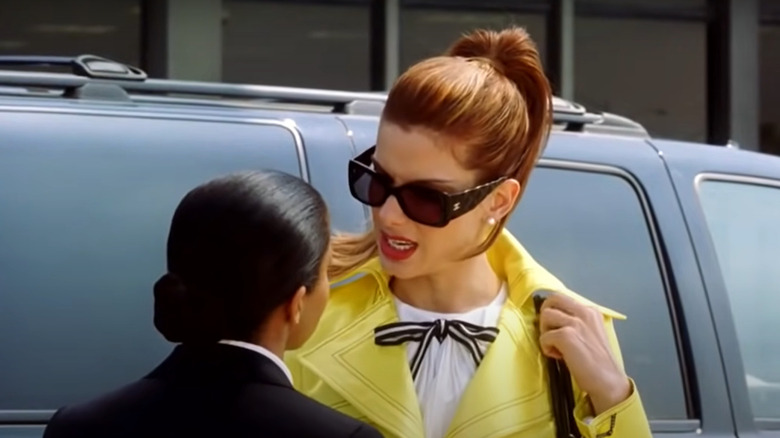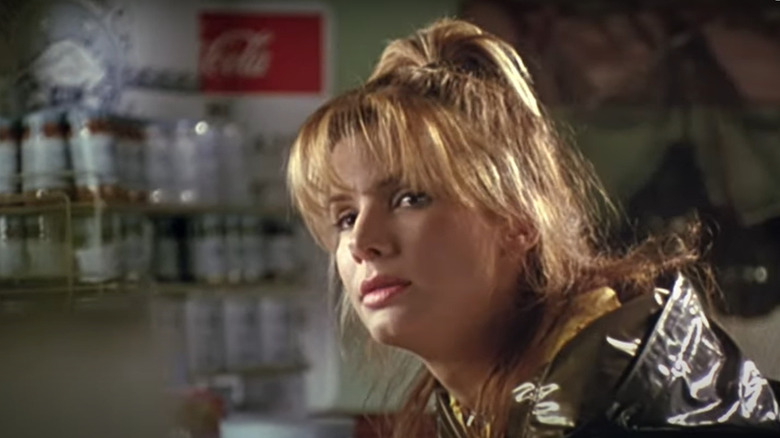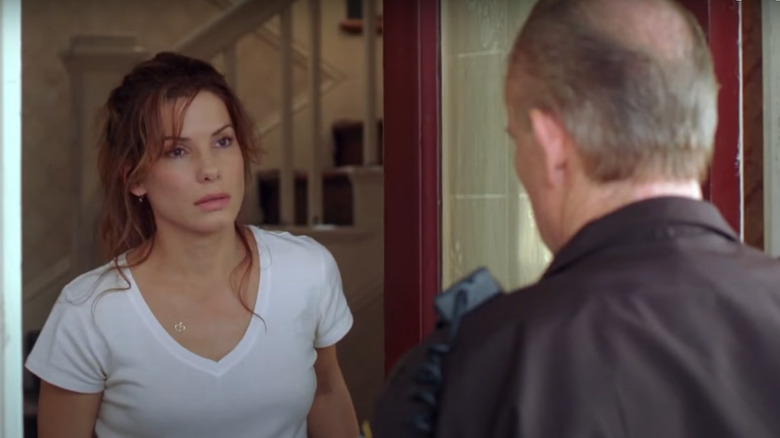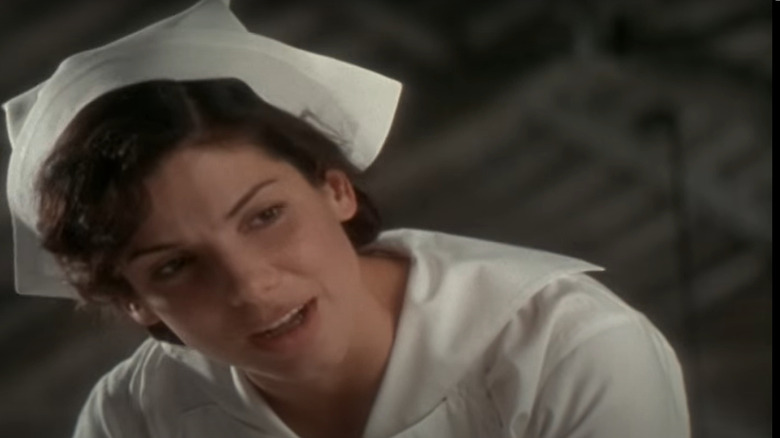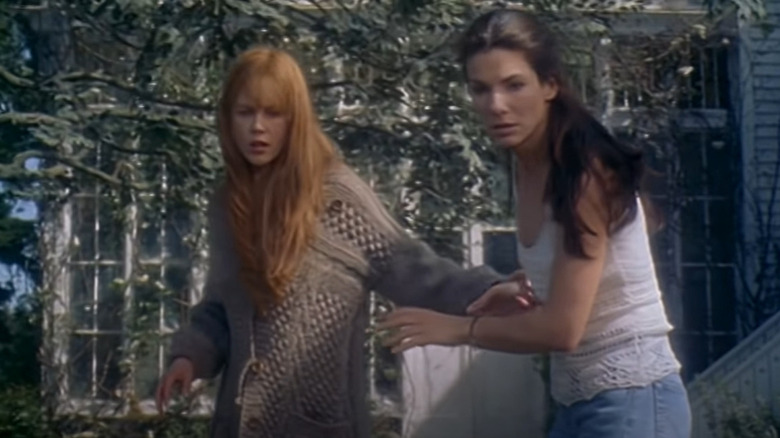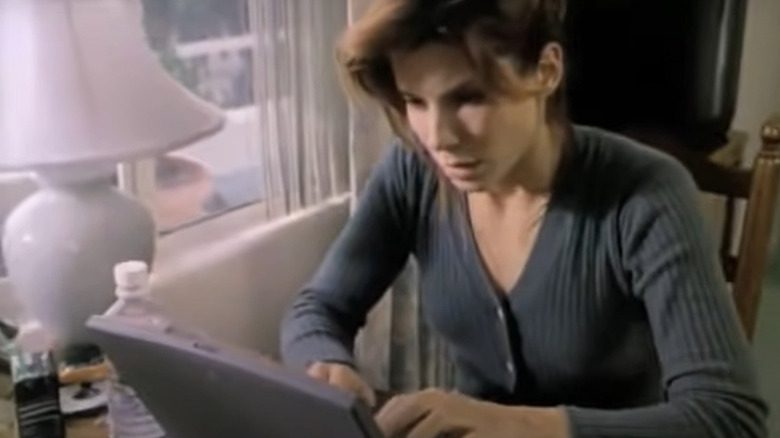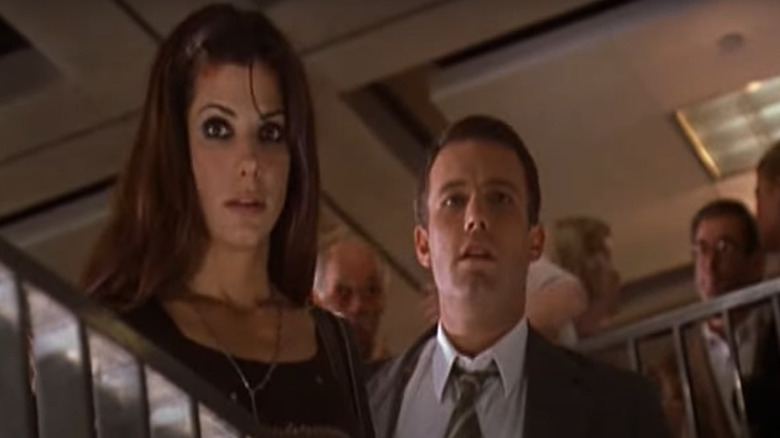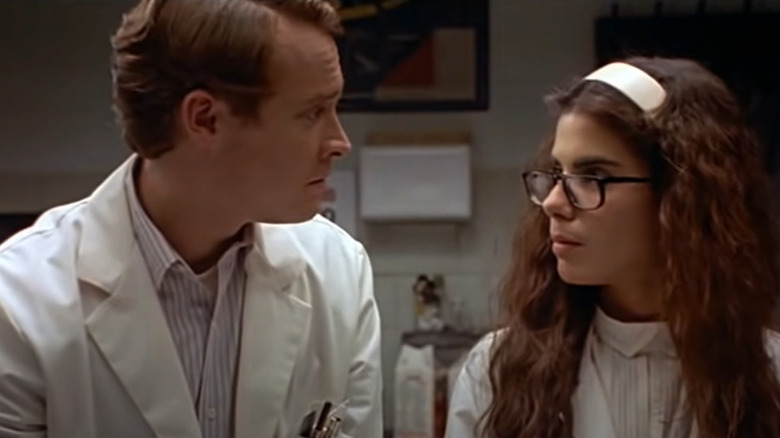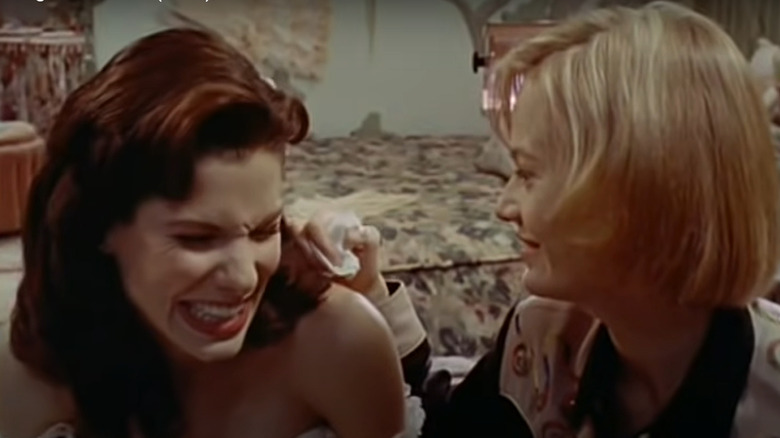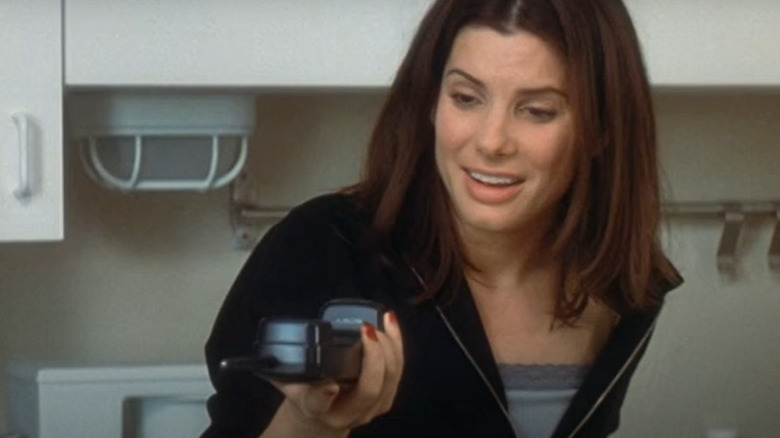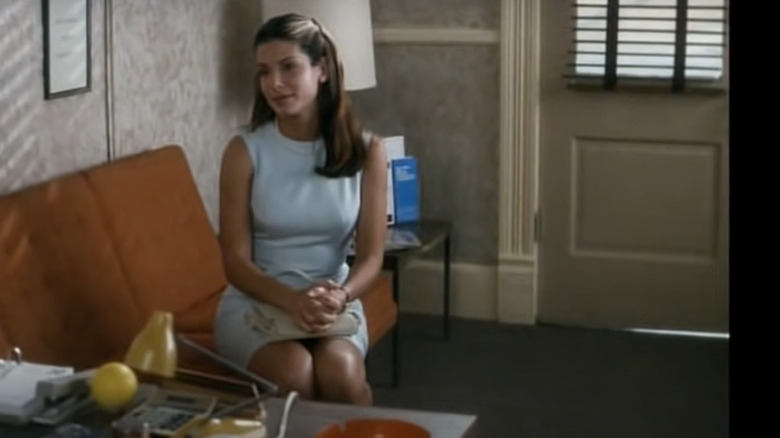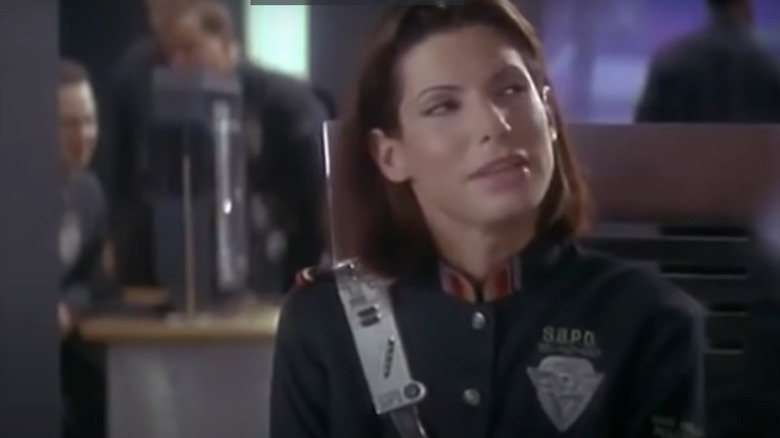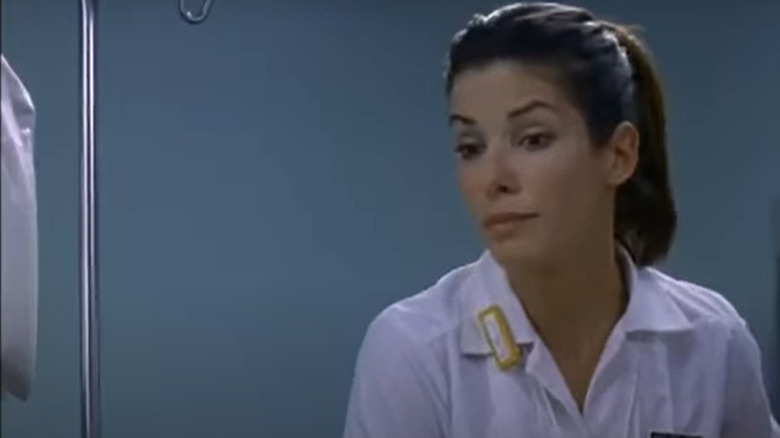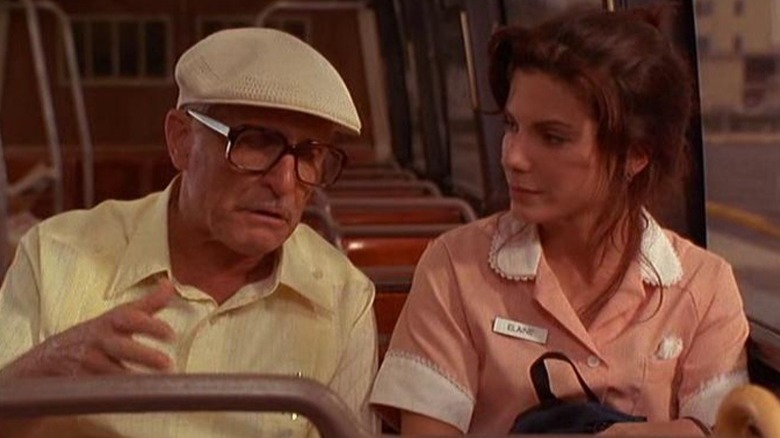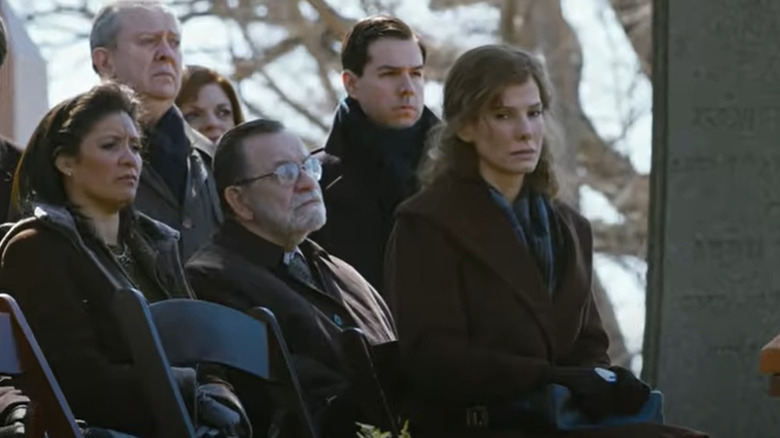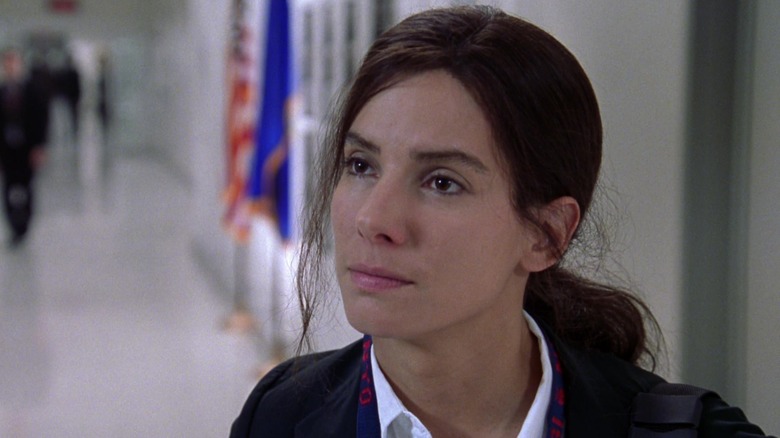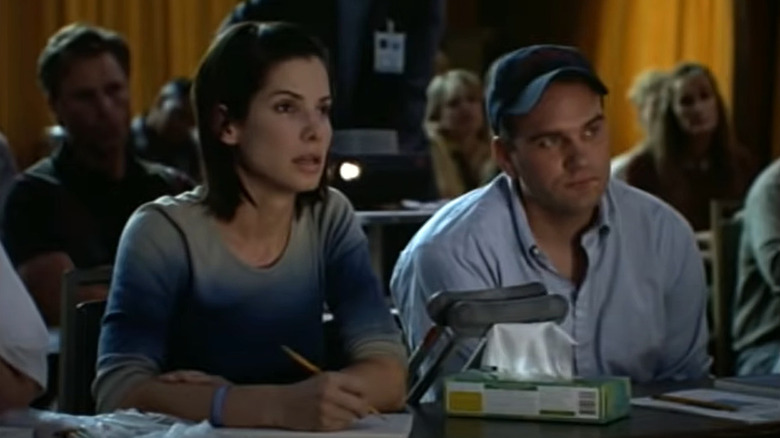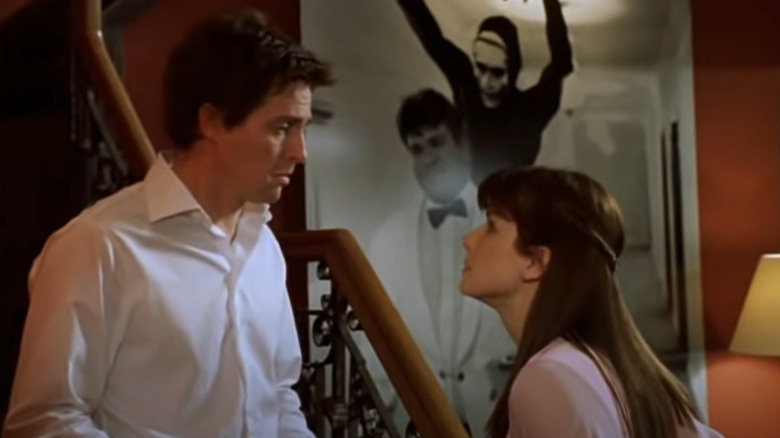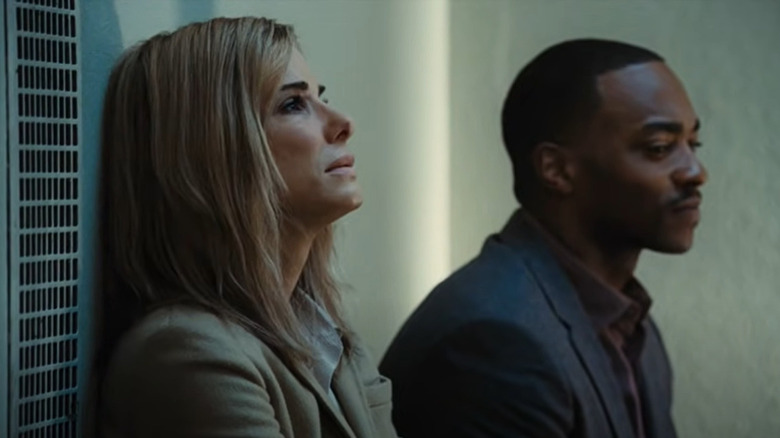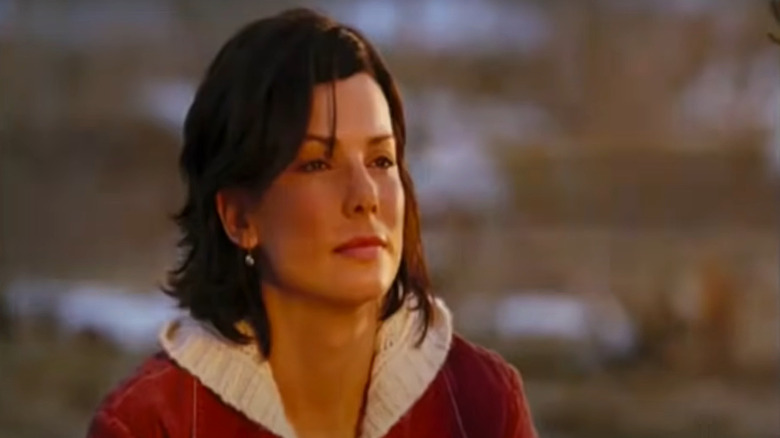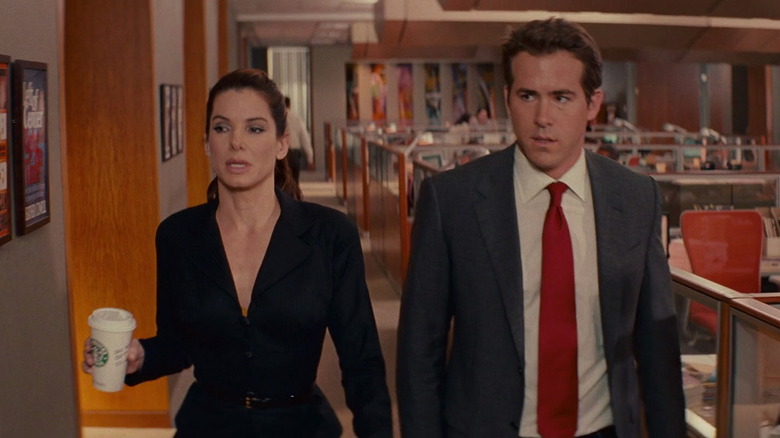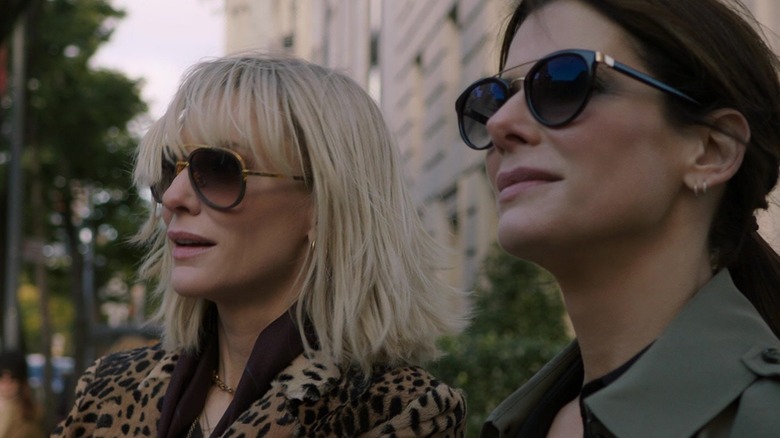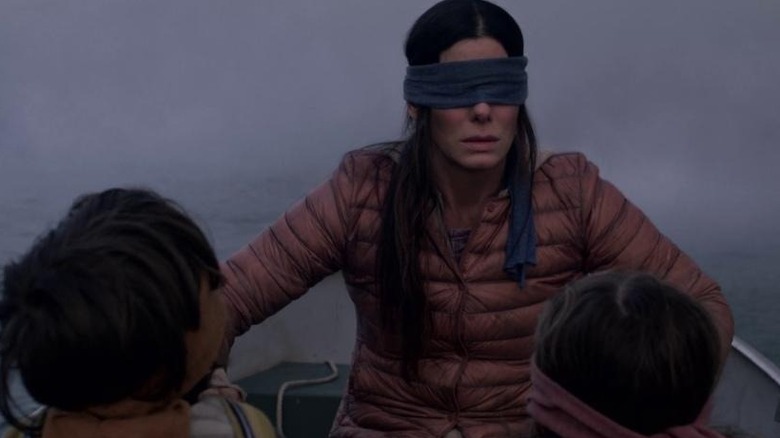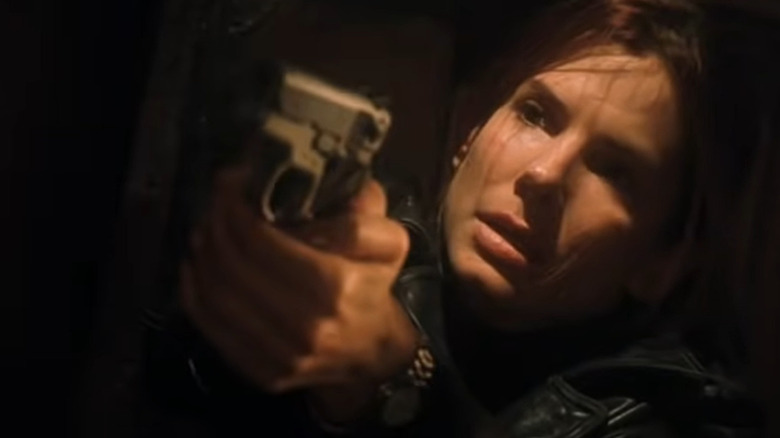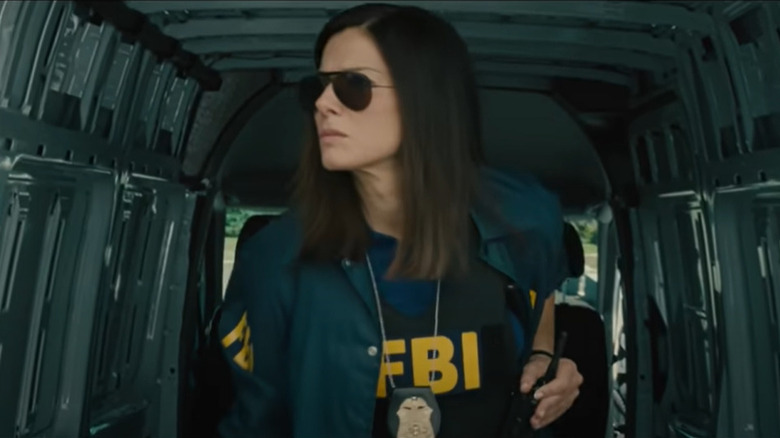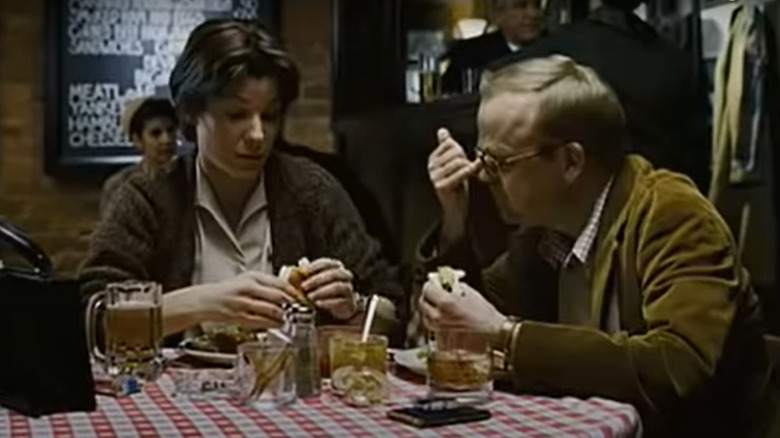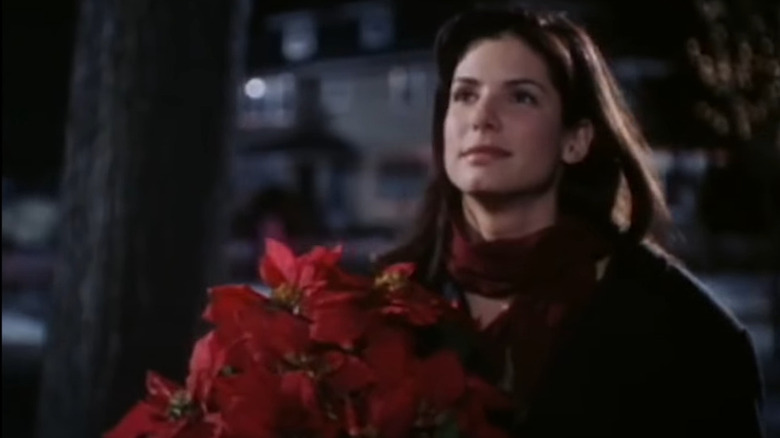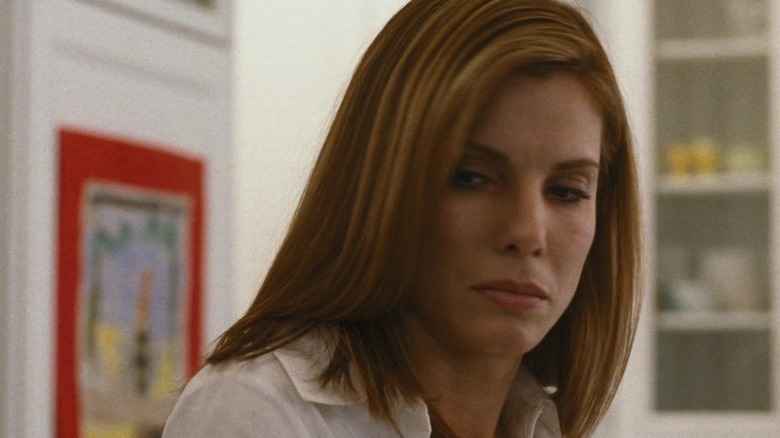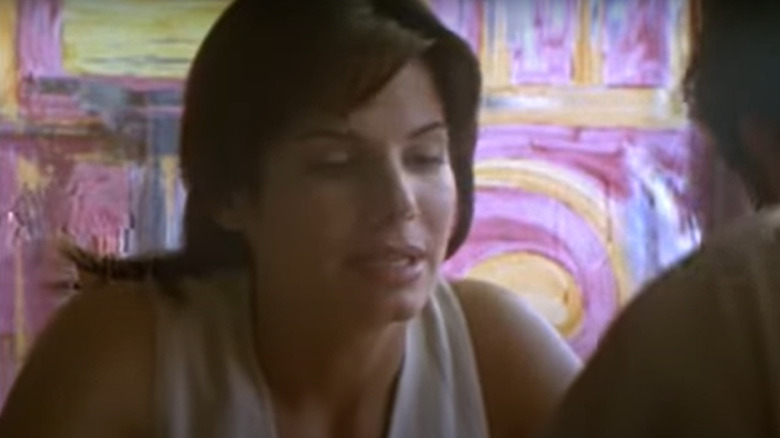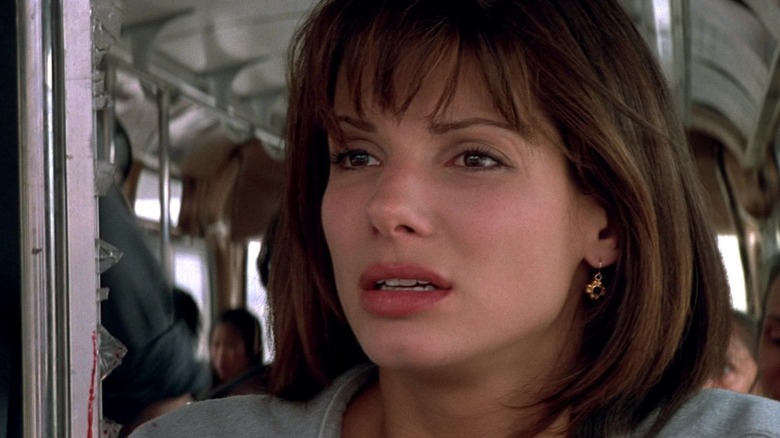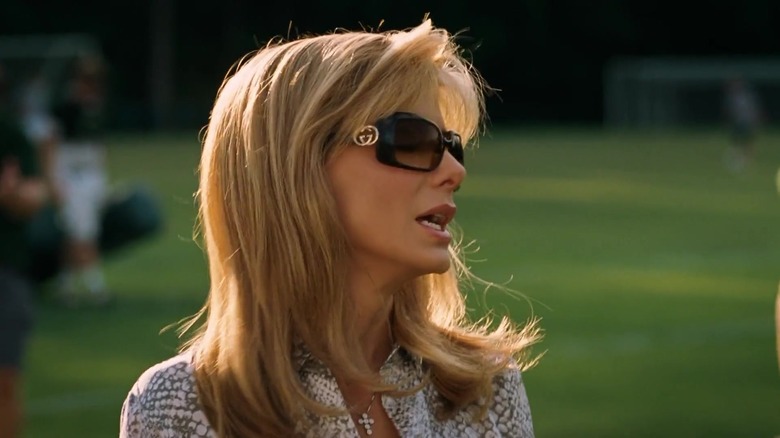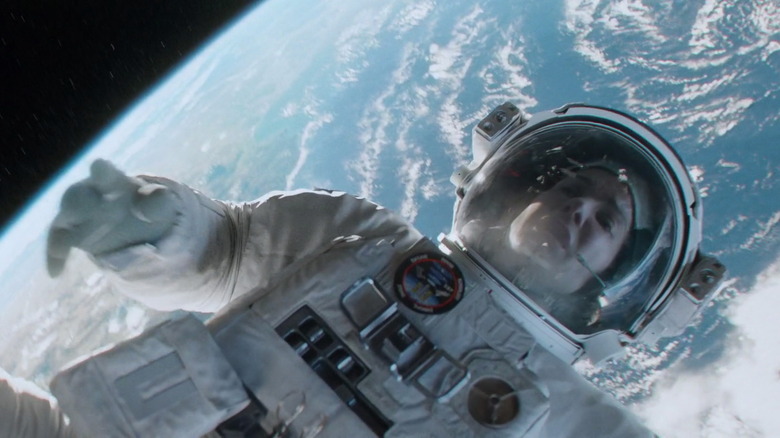Every Sandra Bullock Movie Ranked Worst To Best
With the release of mega-hit "Speed" in 1994, Sandra Bullock catapulted onto everyone's radar and has stayed there ever since. A string of romantic comedy blockbusters after "Speed" helped the actor very nearly usurp Julia Roberts' crown as America's Sweetheart during the remainder of the decade. Since then, Bullock has carved a niche for herself with films about lively, strong-willed, and dynamic women. Her work has won her an Oscar and a Golden Globe, immense praise, and the hearts of audiences everywhere. (This is a stingy description of Bullock's accolades and accomplishments — listing all of them would mean doubling this article in length.)
Of course, all this doesn't mean that Bullock's career is all highs and no lows. She's been known to take risks — The New York Times didn't call her "Hollywood's gutsiest A-list actress" for nothing. Those bets have paid off at times and left her in the lurch at other moments. For every Bullock film that took off, there are others that didn't. In this piece, we aim to chart the ebb and flow of her career with a look at every Sandra Bullock movie, ranked worst to best.
38. Fire on the Amazon
Even the biggest names in Hollywood have used little-known, low-budget movies as jumping-off points for illustrious careers, and Sandra Bullock is no exception. At the outset of her Hollywood journey, Bullock starred in this forgettable B-movie about an eco-activist and a journalist investigating the death of a union leader and, in the process, dredging up a massive cover-up.
At the heart of the movie is a noble message about deforestation, which gets lost in its shoddy execution. Needless to say, the film didn't exactly generate Oscar buzz. DVD Talk pronounced it "cheap-looking" and "unconvincing," while Movie Archive labeled it "one of the dullest movies you'll ever see." If the film does remain the slightest bit notable in the years to come, it will be so only for Bullock's starring role in it. Sure enough, the makers of "Fire on the Amazon" were eager to re-release the film to capitalize on Bullock's post-"Speed" claim to fame.
37. A Fool and His Money
You'd be hard-pressed to find a single word of acclaim for "A Fool and His Money." (Actually, you'd be lucky to find a single word written about the movie at all, that's how nondescript it was.) The only thing that may have aged well about this comedy flick is its name: Given that its director David Adams was later mired in legal trouble for fraud, the title achieves unprecedented levels of irony now, as Adams has said so himself.
In this comedy, advertising executive Morris Codman (Jonathan Penner) invents a religion that preaches the gospel of greed and egotism. Originally known as "Religion, Inc.," the film purports to bring great moral quandaries to the fore but ends up as shallow as its main character. As reviewer Brian Rowe puts it, "The only joy one can have in watching [A Fool and His Money] is to see Sandra trying to make the most of mediocre parts." And although Bullock's role is nowhere as prominent as Pedder's in "A Fool and His Money," the movie also sought to benefit from her stardom, plastering her picture all over its DVD cover.
36. Speed 2: Cruise Control
If "Speed" earned the goodwill of audiences and critics, its sequel undid all of that hard work in one fell swoop. Few movies have felt the wrath of critics like "Speed 2: Cruise Control." The movie earned a spot on Empire's list of the 50 Worst Movies Ever; Complex designated it first on the list of the 50 Worst Sequels of All Time; and the Golden Raspberry Awards, which commemorates the worst cinema of the year, nominated it for eight different "honors."
Bullock returns as Annie Porter in the sequel, while Keanu Reeves' Jack Traven is written out and replaced by Jason Patric's Officer Alex Shaw, in a part the Time Magazine termed "fundamentally uninteresting." The bus from hell is also swapped out for a cruise liner rigged to collide with a tanker. Many lampooned the fact that a movie titled "Speed" takes place on a mode of transportation not known to be particularly "speedy." The LA Times demonstrated that even adolescent moviegoers held similar reservations about such logical incoherencies in the film.
35. Who Shot Pat?
Compared to the gigantic milestones Bullock has reached in her prolific career, the poorly received and universally panned "Who Shot Pat?" seems like a blip. But the movie marks one of Bullock's first leading roles, and that in itself earns it a spot on this list, however low. Stylized as "Who Shot Patakango?" for promotions, the movie digs into racial friction in a high school during the 1950s. Caught up in this veritable mess are Bic Bickham (David Knight) and his love interest Devlin Moran (Bullock). TV Guide called their romance a "tired, conventional Romeo and Juliet scenario." The rest of the story, which is composed of various sentimental episodic chunks, also didn't measure up. Ultimately, "Who Shot Pat" tries to be a nostalgic slice-of-life story, but fails to "piece together all its teen trials into a cohesive entity," as TV Guide puts it. Bullock's role in the film received some recognition, with the LA Times lumping her in with what it calls the movie's "promising new talent."
34. All About Steve
Bullock has broken new cinematic ground often, but "All About Steve" helped her do it for all the wrong reasons. She notched a Razzie for her role as Mary Horowitz in "Steve" — and the next day won an Academy Award for her "The Blind Side" performance, becoming one of a handful of actors to have received both awards in the same year. As if that wasn't enough bad press for the movie, it also nabbed a spot on Time Magazine's list of the "Top 10 Worst Chick Flicks."
In "Steve," the overeager, overbearing Mary meets and becomes obsessed with dashing cameraman Steve Miller (Bradley Cooper), who doesn't exactly reciprocate her feelings, to put it mildly. Still, an offhand remark from Steve gives Mary the impetus she needs to become his groupie and follow (read: stalk) him around the country. At the eye of every media storm is Steve — and close behind, Mary. The film's seemingly pro-stalker stance drew the ire of many a critic, with The Boston Globe even dubbing it a "chick flick for stalkers."
33. The Unforgivable
From the icy critic reviews "The Unforgivable" received, one would think the movie's title referred to the makers of the film, for the inexcusable grief they caused reviewers. RogerEbert.com likened "The Unforgivable" to an act of "Divine punishment" inflicted on audiences. The publication diagnosed the movie as suffering from an identity crisis, citing how it alternates between a redemption story, a courtroom drama, and a thriller.
Bullock, having produced as well as acted in the movie, is not spared any of this criticism. The actor plays Ruth Slater, a paroled convicted killer who seeks redemption and reconciliation with her long-lost sister. She receives cautious sympathy and help from corporate lawyer John Ingram (Vincent D'Onofrio) and his wife Liz (Viola Davis). The critical consensus on Rotten Tomatoes praises Bullock's performance but ultimately deems it insufficient to redeem the movie's shape-shifting plot. Audiences, on the other hand, were far kinder to the movie, even sending it to the top of Netflix charts (via LA Times).
32. Miss Congeniality 2: Armed & Fabulous
Entertainment Weekly describes Bullock's films as often being "wildly hit or miss affairs." Unfortunately for the actor, "Miss Congeniality 2" falls into the latter category. If "Speed 2" imparted any lesson to Bullock, it should have been to steer clear of unnecessary sequels that don't remotely measure up to their parent film. In this case, The Washington Post particularly lamented how supporting characters from the first "Miss Congeniality" were replaced with lesser versions of themselves; for instance, Victor Melling (Michael Caine) was traded in for the less funny, less personable Joel (Diedrich Bader).
The second installment in the franchise does undergo a drastic and much-applauded makeover in one aspect: its genre. The film loses all the trappings of a romantic comedy, instead choosing to focus solely on female friendship and solidarity. Eric Matthews (Benjamin Bratt) is no longer Hart's suave, swaggering partner-in-crime-and-courtship; instead, she has for company the equally suave, equally swaggering female agent Sam Fuller (Regina King). One may even argue that the distinction of the first female buddy-cop film goes not to "The Heat" (another Bullock movie) but to "Miss Congeniality 2."
31. Two If by Sea
In "Two If by Sea," Bullock plays Roz, one-half of a pair of Bonnie and Clyde wannabes. Her better (but really, worse) half, Frank (Denis Leary), is a scheming, thieving simpleton. Roz attempts to be Frank's moral compass, guiding him away from foolhardy plans and towards honest work. Her goals, however, keep getting foiled as Frank hatches and executes a master plan to steal a pricey work of art. Unbeknownst to the duo, the artwork is more priceless than pricey, which ends up putting law enforcement on their heels.
Rolling Stone mourned the (mis)use of Bullock's talents in the movie, going as far as to suggest that its greatest casualty is Bullock "getting dragged down in the drivel." Variety likened director Bill Bennett to a man "at sea without a paddle," alluding to the way the filmmaker banks on stale dialogue, incredulous situations, and poorly fleshed out characters to keep his sinking ship afloat.
30. Premonition
This Sandra Bullock movie is titled "Premonition," which is sadly ironic because the filmmakers could have used a generous helping of it. Such foresight would have helped them avoid shaping the film into what the Sydney Morning Herald calls a "largely ridiculous but terribly serious" affair. In this high-concept movie, Bullock portrays Linda, a housewife who suddenly becomes privy to the knowledge that her husband is about to die a fiery death in a car crash. Time begins to splinter for Linda, and she can momentarily see into a foreboding tomorrow, today, and yesterday.
The movie failed to persuade pundits to take it seriously, in part because it takes itself so seriously. Bullock, however, is a very convincing Linda. By now, the actor has played against type so much that she makes one question what her "type" is after all. She was given due credit by outlets like The Observer for "giving the movie a truthful center."
29. In Love and War
Normally, who wouldn't want to watch Sandra Bullock transport her rom-com craftsmanship to the early 20th century? "In Love and War" allows her to do just that ... but without any of that trademark craftsmanship. In this historical drama, at the height of World War I, a pre-fame Ernest Hemmingway (Chris O'Donnell) is wounded during battle and taken to a place of convalescence. Here, he meets and falls in love with Agnes von Kurowsky (Bullock), who is considerably older than him.
Somewhere along the way, the film loses sight of its protagonist and the unique role he played in shaping history. It instead becomes a "generic historical romance and older woman-younger man fable of sexual initiation," in The New York Times' words. Hemingway's writing is known for its lean and self-disciplined style. To make a film so dense with trivialities is to do the writer's elegance a disservice.
28. Practical Magic
"Practical Magic" packs the firepower of not one but two bankable actors like Bullock and Nicole Kidman, but even that isn't enough to sustain it. In this comedy-slash-romance-slash-horror flick — as Roger Ebert put it, "the movie doesn't seem sure what tone to adopt" — the two actors play sisters who share witchy powers and a deadly family curse: no man can survive falling in love with them.
A movie that promises Kidman and Bullock as deliciously scandalous witches fails to deliver on that promise so spectacularly that outlets like The Independent faulted it for having "little ambition beyond making his stars look adorable." Similarly, Entertainment Weekly joked that the movie "seems to have had a hex put on it." The chemistry between Kidman and Bullock seemed to be the one redeeming quality of "Practical Magic." The expert consensus on Rotten Tomatoes even has critics hoping for more collaborations between the two stars.
27. The Net
Before there was "Searching" or "Clickbait," there was "The Net," a movie about the dangers of living an extremely online existence — in a time when "extremely online" hadn't yet become a thing. Bullock is Angela Bennett, a systems analyst who leads her life through the screen of a computer. But when the entirety of your life fits into your computer system, wiping all evidence of your existence is as simple as erasing data. That's precisely what a bunch of cyber-terrorists do to Angela when she gets entangled in their conspiracy.
The Chicago Reader faulted the film's lackluster script, calling it the brainchild of a "computer with identity problems of its own." Entertainment Weekly praised the movie's "thrill" sequences (which were, ironically, composed mainly of Bullock furiously typing away at her keyboard), but criticized the filmmakers for not including more of them. Even in movies that don't receive audience or critic appreciation, you can still count on Bullock to draw praise. EW, for instance, commended Bullock for her "naturalistic performance."
26. Forces of Nature
"Force of Nature" is tucked away in that twilight zone between a passable movie and a complete dud. The premise of the story takes the concept of romantic attraction almost literally: Jittery groom-to-be Ben Holmes (Ben Affleck) is flying home to his wedding when he meets the exuberant, freethinking Sarah Lewis (Bullock). Instantly, the eponymous forces of nature start hindering Ben from making it home to Georgia and, instead, forcing him into Sarah's arms. The duo's feeble attempts to resist this magnetic pull make up most of the film's laughs.
The ending of "Nature" was the source of several critics' woes. Roger Ebert thought the movie "[led] us down the garden path of romance, only to abandon us by the compost heap of uplifting endings." The Washington Post took issue with the film for "never arriv[ing] at its promised destination." Meanwhile, Variety found the climax "dramatically sound and emotionally persuasive," but conceded that all audiences may not agree.
25. Love Potion No. 9
In "Love Potion No. 9," Paul Matthews (Tate Donovan) and Diane Farrow (Bullock) are a pair of socially awkward biochemists who understand scientific chemistry much better than they do romantic chemistry. The unlucky-in-love Paul consults a mystic for help with his problem and is given a magical, love-inducing potion that causes several more. Diane also partakes of this strange brew, with similarly tricky results.
As The New York Times argued, the movie winds up taking the predictable route through misplaced affections, romantic epiphanies, sudden misunderstandings, and, finally, starry-eyed reconciliations. Its "preponderence of easy, tasteless gags," as TV Guide termed it, also doesn't do "Love Potion No. 9" any favors. NYT compared such ill-timed jokes to "pennies not worth picking up." The Bullock-Donovan team does make up for some of these capers with their charming onscreen rapport, which undoubtedly stemmed from their real-life romance at the time.
24. The Thing Called Love
In "The Thing Called Love," Miranda Presley (Samantha Mathis) heads to Nashville, where musicians like her go to realize their dreams. She meets and befriends a number of other hopefuls, among whom are potential love interests James Wright (River Phoenix) and Kyle Davidson (Dermot Mulroney). Also part of the gang (but not the love triangle) is the spirited Linda Lue Linden (Bullock). Released a year before Bullock caught her big break with "Speed," "The Thing Called Love" didn't exactly offer her a leading role, but it did allow her the chance to cut her songwriting teeth on the song "Heaven Knocked on My Door." Neither Bullock's songwriting prowess nor the plot is enough to make a star out of this "mildly engaging, formulaic film," as The New York Times called it.
"Love" perhaps continues to be best known as Phoenix's last screen appearance before his untimely death. In fact, director Peter Bogdanovich chalked up the film's poor performance at the box office to Paramount's concerns about a wider release following Phoenix's passing. The studio, it seems, didn't want to appear to be milking the actor's demise for ticket sales.
23. Divine Secrets of the Ya-Ya Sisterhood
In "Divine Secrets of the Ya-Ya Sisterhood," the already frayed relationship between Sidda Walker (Sandra Bullock) and her mother Vivi (played by Ellen Burstyn in old age and Ashley Judd in youth) is dangerously close to falling apart. In steps Vivi's "Ya-Ya" sisterhood, a tight-knit gang of Southern dames who have sworn a blood oath to endure love, heartbreak, and, apparently, old age together. The belles set about mediating this mother-daughter conflict before it descends into an all-out war. They do so by recounting Vivi's life in great detail and showing Sidda who her mother was before she had a child.
Perhaps the movie's greatest downfall is that it treats its characters as caricatures of themselves. "Sisterhood" could have blossomed into something truly divine, if only it didn't get so caught up with what Variety termed "surface impressions" and instead focused on shaping its characters with authenticity. Despite that, argued Variet, "there are pleasures to be had from watching so many grand actresses strut their stuff."
22. Hope Floats
In 1998, Sandra Bullock decided to branch out by taking on the mantle of producer for "Hope Floats." And although the film would go on to be a critical and commercial flop, it marked the first of many such production outings for Bullock. Luckily for her, not all ended up like "Hope Floats."
Bullock stars as Birdee, a homemaker leading an idyllic life in Chicago — that is, until her husband cheats on her with her best friend. A disgraced Birdee moves back to her Texan hometown, her daughter Bernice (Mae Whitman) in tow. If this sounds like the start of a saccharine self-discovery-cum-romance story, that's because it is. The San Francisco Chronicle compared the movie to "100 percent artificial sweetener." Other outlets like The Republican also charged the film with being a run-of-the-mill romance but acknowledged the fine performances put on by Bullock and other cast members. Most critics congratulated Bullock on an acting job done well, but not well enough to revive — or as the Chronicle put it, "buoy" — the film.
21. Demolition Man
If any single movie could be credited with launching Sandra Bullock's career, it might be "Demolition Man."
Set in a dystopian future that TIME Magazine dubbed hellish, this sci-fi action-comedy imagines a world in which everything considered a "vice" — alcohol, cigarettes, fatty foods, sex — is outlawed, and Big Brother keeps watch over all. In the midst of all this, dangerous criminal Simon Phoenix (Wesley Snipes), once sentenced to cryo-sleep for his crimes, escapes from captivity. In pursuit of Phoenix, Lieutenant Lenina Huxley (Bullock) thaws out Phoenix's nemesis, disgraced LAPD cop Spartan (Sylvester Stallone). The film borrows some of its dystopic vision — and all of the Lieutenant's surname — from Aldous Huxley and his novel "Brave New World."
Reviewers like Eugene Siskel and Roger Ebert found that the film's satirical undertones set it apart from similar fare. In the same vein, The Washington Post thought the movie had "more imagination and wit than the typical example of the slash-and-burn genre."
20. Gun Shy
"Gun Shy" polarized critics: while The New York Times called it "one of the most subtle and inspired comedies" of the year, the New York Post (via Rotten Tomatoes) found it to be a "weird exercise in toilet humor."
The movie was released at a time when it was trendy for violent male characters like Tony Soprano and Paul Vitti to seek out psychiatric help. Our "Gun Shy" protagonist Charlie Mayough (Liam Neeson) busts mobsters like Soprano but is nevertheless in equal need of therapy. He finds comfort in the armchair of psychiatrist Dr. Jeff Bleckner (Michael Mantell) and in the arms of spunky nurse Judy Tipp, played by Bullock. The New York Times praised this sharp premise and director Eric Blakeney's cinematic treatment of it. The publication also heaped praise on Bullock, not only for her fine acting but also for her acumen in producing the right movie.
19. Wrestling Ernest Hemingway
It's little wonder that Bullock has commanded such respect for her performances, given that she polished her acting skills among legends like Robert Duvall and Richard Harris in movies like "Wrestling Ernest Hemingway." In this lighthearted drama, Duvall and Harris play a pair of lonesome retirees, respectively named Walter and Frank, who bond over their shared old age and solitude while bickering about everything else. Frank is a cantankerous (former) sailor who claims to have wrestled Hemingway himself (hence the title), while Walter is a finicky (former) barber who derives the most joy from his interactions with a waitress named Elaine (Bullock). Soon, the two seniors become inseparable. If you're wondering whether this premise is as sweet as it sounds, don't worry — it is. Unfortunately, it sometimes crosses the line into "sappy and message-laden," as Variety put it.
18. Extremely Loud & Incredibly Close
"Extremely Loud & Incredibly Close" follows the incredibly close relationship between Oskar, a bright, autistic boy, and his father Thomas (Tom Hanks). Thomas, in a bid to get Oskar to relate to his surroundings and people better, designs unique missions and expeditions for him. When Oskar loses his father in the September 11 attacks, he channels his grief into unraveling any last mysteries Thomas may have left for him. All this while, he eschews his mother Linda's (Bullock) attempts at connection. Bullock's role is small in this film — with just 24 minutes of screen time (per The Hollywood Reporter) — but still impactful and crucial to the tale's ending.
In telling the story of a neurodivergent boy coping with trauma, "Close" deals with a pair of delicate subjects. Some considered this choice brave, while others believed it to be opportunistic. The LA Times thought the drama "redefined our expectations of filmmakers who try to examine the still aching wound [of 9/11]." Meanwhile, The Toronto Star was relatively upfront in accusing "Close" of "exploiting a tragedy" and being "calculated as Oscar-bait." Eventually, the movie did nab itself an Oscar nomination for Best Picture and in doing so, created a minor furor among award experts. Many thought the nomination undeserved, with Paste Magazine calling the choice "certainly the worst for at least 28 years."
17. Miss Congeniality
The first "Miss Congeniality" is everything its sequel is not: endearing, suspenseful, and of course, actually funny.
Essentially a modern cinematic interpretation of the Pygmalion play, it tells the tale of FBI Special Agent Gracie Hart, who excels at fighting crime, but not so much at everything else. This is all set to change when Hart has to go undercover as a supermodel and is assigned her own version of Henry Higgins — or as he's known in the movie, Victor Melling (Michael Caine). The film's feminist message goes something like this: glamour doesn't necessarily come at the expense of a woman's smarts. And Hart can deliver a knockout punch in heels as well as chunky shoes. Pundits, however, did have some bones to pick with "Miss Congeniality”: The New York Times called it "standard-rate," while Roger Ebert thought it "lacks any ambition." Others like Empire, however, were all compliments for what they called a "genuine crowd-pleaser."
16. 28 Days
For "28 Days," Bullock shed her girl next door image to play embittered rehab attendee Gwen Cummings. Still, "28 Days" is not a heavy, pensive look at addiction, but a joyful meditation on making a fresh start. Making a lighthearted movie about a subject this sensitive takes nuance and restraint. Critical opinion on whether "28 Days" accomplished that is divided.
Rolling Stone, for one, thought director Betty Thomas put forth a jocular story, but never at the expense of Gwen's issues. It praised the movie for "giv[ing] the rehab genre a fresh twist." At the other end of the spectrum, the Rotten Tomatoes critical consensus called Thomas' treatment of the subject matter "superficial and preachy." Audiences weren't quite so polarized — the movie fared reasonably well at the box office.
If you or anyone you know is struggling with addiction issues, help is available. Visit the Substance Abuse and Mental Health Services Administration website or contact SAMHSA's National Helpline at 1-800-662-HELP (4357).
15. Two Weeks Notice
What do you get when you combine the powers of two romantic-comedy stalwarts like Sandra Bullock and Hugh Grant? A mega-hit like "Two Weeks Notice," of course. The fact that one of Bullock's most adored and well-known roles is so low on this list is a testament to how prolific and versatile an actor she really is.
In "Two Weeks Notice," Bullock's Lucy Kelson is a lawyer fighting on the side of good; George Wade (Grant) is the antithesis of everything she stands for. Through a mixture of luck, fate, and George's hubris, they end up on the same side. Both actors have played similar roles in separate movies, but paired together, they become a force that Entertainment Weekly called "inspired" and Roger Ebert termed "lovable." Calling romantic comedies the "comfort food of the movies," he applauded "Two Weeks Notice" for hitting precisely that note.
14. Our Brand Is Crisis
Bullock followed one of her most memorable roles as Dr. Ryan Stone in "Gravity" with yet another movie about a fierce, unrelenting female character. Her role as the razor-sharp spin doctor "Calamity" Jane in "Our Brand Is Crisis" earned her almost universal praise, even if the movie itself was neither an outright critical nor commercial success. Variety deemed Calamity Jane "easily one of the best female roles of the last 10 years." What makes Bullock's portrayal even more admirable is the fact that the role was initially sketched out for a male actor — specifically George Clooney.
In the movie, Jane is tasked with giving a heavy political makeover to a widely disliked Bolivian presidential candidate, Pedro Castillo (Joaquim de Almeida). She battles language barriers, political gaffes, and her equally shrewd nemesis, Pat Candy (Billy Bob Thornton), who works for Castillo's opposition. Not only is Bullock's onscreen persona adept at managing political crises, so is, apparently, the actor herself. After all, critics like The Guardian and Indiewire respectively credited her with "adding gravity to the political satire" and "carrying the film" on her own.
13. The Lake House
While "The Lake House" may not have been a critical darling, it netted a handsome sum at the box office, comfortably recouping its sizable budget. The movie reunited Bullock with her "Speed" co-star Keanu Reeves, and the pairing proved to be a big draw for audiences. Critics, on the other hand, weren't so easily appeased. Many found the movie's central premise — a magical lake house connects past to present and Bullock's Kate to Reeves' Alex — lacking. Most took issue with the movie's logical consistency or lack thereof. The New York Times didn't mince its words in calling the film "wondrously illogical" and "completely preposterous." "The Lake House" received its most glowing review from Roger Ebert, who argued that the film relied on "emotional" and not "temporal" logic to make its story truly sing.
12. The Proposal
"The Proposal" cleaned up at the box office and netted Sandra Bullock her best opening weekend to date at the time. And although the romantic comedy was not deemed Oscar-worthy, it did fare well at less highbrow award shows like the People's Choice and Teen Choice Awards.
In "The Proposal," Margaret (Bullock) is a caustic, tough-as-nails boss who cedes her personal boundaries to no one. Andrew (Ryan Reynolds) is her meek employee. Ironically, their roles become reversed when Margaret has no choice but to put forth a proposal to Andrew: Marry her to prevent American immigration authorities from deporting her back to Canada.
As Roger Ebert pointed out, what really shores up this movie is its supporting characters, ranging from Andrew's cheery mother Grace (Mary Steenburgen) to his shrewd grandma Annie or "Gammy” (whom the almighty Betty White plays to perfection). That's not to say that Bullock and Reynolds' performances or chemistry are any less indispensable to the success of the film. Entertainment Weekly declared the "chemical energy" between Bullock and Reynolds to be "fresh and irresistible." The Huffington Post cautioned audiences that they "won't be able to resist [Bullock and Reynolds'] charms."
11. Ocean's 8
It's rare that Sandra Bullock isn't the star attraction when she appears in a movie, but "Ocean's 8" puts her in the envious company of an all-star cast that includes Cate Blanchett, Anne Hathaway, Sarah Paulson, and Rihanna, to name a few. They gel together in a manner that creates an "unpredictable, irresistible alchemy," as RogerEbert.com put it.
"Ocean's 8" turns gender tropes on their head by swapping out thief extraordinaire Danny Ocean (George Clooney) and his band of criminals for his sister Debbie (portrayed by Bullock) and her gang of female thieves. This time around, Debbie sets her sights on her most ambitious mission yet: stealing a priceless necklace at the MET Gala.
Debbie has all of her brother's cunning, but none of the male privilege that often allowed him to so deftly wield his slickness. Instead, she pulls off heist after heist by relying on the tendency for women to be relegated to the sidelines — as she puts it, "A 'her' gets ignored. And for once, we want to be ignored." Bullock ably takes over for Clooney as a new Ocean with what Variety deemed the "debauched insolence of a hungry criminal."
10. Bird Box
"Bird Box" soared to the top of Netflix viewership charts days after it debuted, attracting a staggering 45 million viewers in the first week of its release. Such was its enormous impact that The Atlantic theorized the movie could be the newest blueprint for Netflix's slate of programs.
Bullock portrays Malorie, an expectant mother who wants to be anything but. Her qualms have to be momentarily set aside as the apocalypse — in the form of monsters who terrorize you to the point of suicide — descends on the world. To see these creatures is to go mad, and Malorie and her found family of survivors have to blindfold themselves in order to live.
The film clicked with audiences more than it did with critics. The Atlantic described the movie as "thriving on mood, not details" — albeit it did find its "ghoulish set pieces" to be particularly striking. To that end, the movie leaves the audience blind to the appearance of these creatures; we never see them directly, only through illustrations. Since characters project their worst fears onto these monsters, it seems apt — and even more terrifying — to allow audiences to do the same.
9. Murder by Numbers
"Murder by Numbers" begins with murder and slowly diverts onto psychological inquiry as it investigates the deranged psyche of two young psychopaths, Justin Pendleton (Michael Pitt) and Richard Haywood (Ryan Gosling), out to commit the perfect crime. Dead set on catching them is Detective Cassie Mayweather (Bullock), whose troubled past haunts her present.
Such movies usually keep their characters in the know and their audience in the dark. "Murder by Numbers" does the reverse, which both Roger Ebert and The New York Times called one of its most "interesting" and "surprising" aspects, respectively. Watching Mayweather connect the dots between murder and murderer brings a certain type of enjoyment, especially when you know more than she does. Also riveting are the scenes between the two teenage murderers as they repeatedly try to psychologically best the other. Gosling and Pitt do a splendid job of conveying the dark, frenzied thought process of their morally corrupt characters.
8. The Heat
Sandra Bullock's expansive range allows her to play a detective in a grim murder mystery like "Murder by Numbers" as well as she delivers a parody of that character type in a film like "The Heat." If Cassie Mayweather and Gracie Hart had a baby, she'd look a lot like FBI top cop Sarah Ashburn (Bullock). Ashburn channels Mayweather's uncanny detecting ability and Margaret's no-nonsense, nose-in-the-air work ethic as she attempts to take down a notorious ring of drug dealers. Her partner is local cop Shannon Mullins (Melissa McCarthy), who acts as the uncouth, unkempt yin to Ashburn's prim and proper yang.
The film allows its plot to take a back seat to its many gags. As RogerEbert.com put it, "Its Boston-drug-lord-plot is merely the architecture on which to present the dynamic of the two main characters." Luckily, the slapstick comedy arising from Ashburn and Mullins' equation easily carries the film right up to the finish line. The Guardian called it a movie that is "completely uninterested in anything that isn't funny."
7. Infamous
"In Cold Blood," Truman Capote's magnum opus about mass murder in a Kansas backwater, made him a household name. "Infamous" brings us the story behind that story. Bullock plays the role of Truman's (Toby Jones) friend and confidant Harper Lee, who helps him in his investigations.
While "Infamous" won the approval of many critics, the film was unluckily released only a year after the widely acclaimed "Capote," which told the same story from a slightly different angle. The San Francisco Chronicle, for instance, called "Infamous" a fine example of "intelligent, thoughtful filmmaking" that only failed to reach the same yardstick as "Capote." Bullock's performance, however, was a standout by any measure: The Chronicle called the actor's portrayal of Harper Lee "the performance to take from the movie," and Variety dubbed it a "high point."
6. While You Were Sleeping
"While You Were Sleeping" may have notched Sandra Bullock her first Golden Globe nomination for Best Actress, but that's not all the film was good for. As the Orlando Sentinel (via Rotten Tomatoes) puts it, "Sleeping" allowed the actor to "play second fiddle neither to males nor special effects" for the first time in her career.
In "Sleeping," Bullock stars as starry-eyed romantic Lucy Eleanor Moderatz, who, when she's not manning the toll booth at the train station or moping around with her cat, daydreams about debonair train commuter Peter Callaghan (Peter Gallagher). In classic rom-com fashion, Lucy's dreams come alive when she's misidentified as Peter's fiancée — and he's not around to correct her. If ever a film fit the description of feel-good, "Sleeping" would be it. The Hollywood Reporter fondly labeled it a "wonderfully unmodern and unabashedly melodramatic" tale, while SF Gate praised the movie for its seemingly endless supply of humorous twists and turns.
5. Crash
Sandra Bullock has often surprised viewers with her unconventional movie choices, but it still came as a shock to see her playing the role of a racist, upper-class housewife in "Crash," which won the Oscar for Best Picture in 2004 (albeit controversially so). The movie also made Empire Magazine's list of 500 Greatest Films of All Time and IFTA's (Independent Film & Television Alliance) list of 30 Most Significant Independent Films from 1980 to 2010.
"Crash" incorporates characters from different racial and socio-economic backgrounds projecting their prejudices, aspersions, and misplaced angst onto the real world and each other. The Independent described the film's artistry aptly: "[The filmmakers] have given the famous melting pot a fierce old stir, and from it drawn a passionately felt, somewhat contrived but highly watchable drama." In its profile of the actor, the New York Times commended Bullock for continuously stepping outside her comfort zone and "fighting for smaller dramatic roles that weren't always flattering."
4. A Time to Kill
In this rousing John Grisham adaptation, lawyer Jake Brigance (Matthew McConaughey) agrees to provide legal defense for Carl Lee Hailey (Samuel L. Jackson), a Black man who has committed a morally ambiguous crime. After his daughter is barbarically beaten and raped, Carl Lee resorts to the oldest form of justice: vigilantism. In defending Carl Lee, Brigance not only fights a legal battle but also a political and cultural one. The lawyer needs all the help he can get; luckily, law student Ellen Roark (Bullock) arrives to bail him out.
The New York Times commended "A Time to Kill," saying it comes bearing "an outstanding cast, a gripping and racially charged story, a tumultuous Southern backdrop and good old-fashioned dramatic sweep." But the film also sparked some debate: Libération accused it of condoning the death penalty in the name of justice.
3. Speed
50mph: that's all the speed it took for Sandra Bullock and Keanu Reeves to launch themselves to superstardom. Bullock, for one, never imagined this "little silly bomb-on-the-bus movie" would end up being the seventh-highest grossing film the year it was released. Producers, however, knew they had bet on a winner when screenings of "Speed" tested off the charts. Audiences heading to the washroom would walk in reverse because they couldn't take their eyes off the screen. It's no wonder Roger Ebert thought "Speed" fit into the type of film he called "Bruised Forearm Movies" — as he put it, "you're always grabbing the arm of the person sitting next to you."
The high-concept "Speed" story shifts into high gear when a bomb is programmed to detonate if a bus drives under 50mph. One heroic cop named Jack Traven (Reeves), aided by commuter Annie Porter (Bullock) subbing for an injured bus driver, aims to outrun this fate. Of course, sparks fly between Jack and Annie — once, literally, as they attempt to get off the bus. Without being trite, the movie has all the makings of a blockbuster: edge-of-your-set suspense, electrifying action sequences, and endearingly corny romance. Popcorn entertainment just doesn't get any better.
2. The Blind Side
Bullock won herself critical acclaim and an Academy Award for Best Actress by assuming the role of real-life Leigh Anne Tuohy in "The Blind Side." All this despite Bullock passing on the role multiple times. The actor walked back her decision after meeting Tuohy in person and geared up to play the mother-of-two (later three) who helps the destitute, neglected Michael "Big Mike" Oher realize his potential as an offensive lineman.
Bullock's win and the movie's commercial success would have put "The Blind Side" at the very top of this list if it weren't for the controversy it was mired in. Some critics and scholars charged the film with not doing justice to its biographical source material and, in its stead, propagating the "white savior narrative" that numerous critical darlings are guilty of. The real-life Oher himself took issue with his depiction as a simple-minded, slow-on-the-uptake individual instead of someone who constantly lacked academic support (via Oher's book "I Beat the Odds").
1. Gravity
Everything director Alfonso Cuarón touches turns to gold, and "Gravity" is no exception. The movie won big both at the box office and at award shows, firmly cementing its place in sci-fi history. In terms of concept, production scale, visual technique, and general audacity, "Gravity" goes where no film has gone before. So much so that Rolling Stone declared, "It's more than a movie. It's some kind of miracle."
Sandra Bullock and George Clooney star as Ryan Stone and Matt Kowalski, two astronauts marooned in outer space, fighting to stay alive. It's up to Bullock to shoulder the majority of the film and she does so splendidly, prompting The Wall Street Journal to call this the "best performance of her career." During filming, Bullock found herself inside a "10-foot-by-14-foot box equipped with special lights and placed on a darkened soundstage," which was precariously close to her character's situation: trapped in a dark, unfriendly space away from all forms of human contact. "I was literally acting off of nothing for up to 10 hours a day, with headphones my only connection to Alfonso," recounted the actor in her New York Times profile. It's hard to argue with the results.
